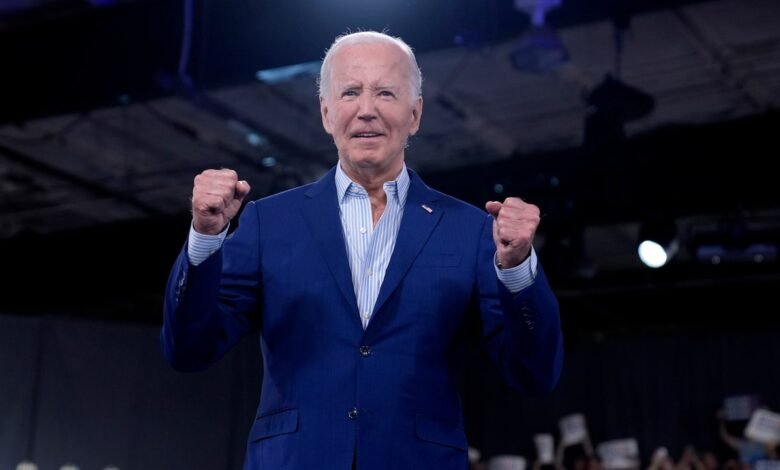
There is an unattributed maxim in sports that says the backup quarterback is the most popular man in town. The idea is that fans will inevitably begin to pick apart the starter and blame him for everything that goes wrong. If the team starts losing, fans start fantasizing about the backup and imbuing him with abilities he likely doesn’t have. See that interception the starter threw across the middle? The backup would never have thrown that because he’s not a glory hog like the starter.
The problem, of course, is that the backup usually is much worse at football than the starter, even if he has provided some tantalizing glimpses in the short stints where he takes the field. If he actually has to play the starter’s role, he will quickly remind you why he’s the backup.
Like pretty much everyone who watched the first Presidential debate between President Joe Biden and Donald Trump, I was stunned by Biden’s incoherence and his inability to put together sentences on air. It was hard not to immediately think back to the clips we had been seeing on social media throughout the past few months—the ones that many said had been selectively edited and were misleading. Those snippets showed the President in what appeared to be a state of distress and unable to finish many of his sentences. We saw him frozen during a photo opportunity, much like Mitch McConnell last year. We also saw him looking confused and almost scared onstage before being gently escorted away by Barack Obama. For Democrats, the debate was ninety minutes of crushing confirmation that those clips were, in fact, depicting reality.
The conclusion seemed clear enough: Biden has to drop out. If this column had been written right after the debate, I certainly would have joined in on that chorus. (I am on vacation this week.) But, a few days after the President’s disaster, it seems just as clear to me that the Democrats don’t have any other option than to hurtle toward November with him as the nominee.
There is another maxim in sports that says if you have two starting quarterbacks, you really have none. This means that, if you’re deciding between two players and can’t commit to one, it likely means that both can’t get the job done. Democrats might want to consider an amended version: If you have five or six backup quarterbacks, you have none. That is all to say, the Party and its adherents are currently in a position where they have justifiably lost all hope in the starter. The problem is that they can’t even figure out who the backup could possibly be. Is it Gretchen Whitmer, Kamala Harris, J. B. Pritzker, Gavin Newsom, or Raphael Warnock?
This is a terrible situation to be in, but, the day after the debate, Biden went to Raleigh, North Carolina, and delivered an energetic speech, in which he sounded both defiant and aware that the debate had not been a good moment for him. This constituted a quick shift in the Party’s messaging, which, on Thursday night, included a bizarre scene in which Jill Biden congratulated her husband for answering “every question” and knowing “all the facts,” as if the President was a nervous ten-year-old who had just named all fifty state capitals. Barack Obama then weighed in on X, reminding people that he, of all people, knew that “bad debate nights happen”; his first debate against Mitt Romney, in 2012, had also gone poorly, causing consternation among Democrats. The powerful figures within the Party, it seemed, had decided to rally around their man.
This is the math that the Party is up against: Prior to the debate, Trump was generally considered the favorite to win the White House. Nate Silver gave Trump a sixty-six-per-cent chance of winning the election. Many measures, however, suggested Biden was closing the gap. Flash polls that were taken after the big event showed a wide range of outcomes, though these surveys are often thought to be unreliable. But the best-case scenario for Biden seems to be that his support has dipped only slightly, as opposed to cratering. Nevertheless, the task has clearly got harder.
Biden’s debate performance also carries the potential of affecting other races. Democratic-leaning voters with genuine concerns about how an infirm man will handle running the country might choose not to vote in the election, which will hurt all the other Democratic candidates on the ballot. And, aside from the electoral concerns, it might be immoral to allow an entitled octogenarian to handle foreign policy at a time of global crises. It’s one thing when you can’t get your elderly father to stop driving their car because you’re worried they will run over a child. It’s quite another when the elderly father has the power to invade another country.
These are all extremely compelling reasons to ask Biden to step aside or to start an insurgency leading up to the convention in August. But if the point of this election is to defeat Trump—and I imagine for many Democrats it is—then you have to do some dirty calculations and realize that you don’t have a Plan B because all the backups aren’t ready yet, and because introducing one of them in the middle of the game is a risky gamble, at best. There are countless problems that would come with the process of choosing a new candidate—if you bypass Kamala Harris, for example, does she just go quietly? And how do you sell the optics of nullifying the logical norms of succession for the first Black person and first woman to ever serve as Vice-President? If you’re a supporter of Gavin Newsom, are you even sure he will agree to take on a potential losing and chaotic run at an office he could much more credibly run for in 2028? If you believe Gretchen Whitmer has the best chance of defeating Trump, because of her advantage in the “blue wall” states, does her relative paucity of national connections tank her chances in a convention setting? Perhaps none of these are as weighty of a concern as Biden’s bad debate, but every road you go down with any of the possible substitutes kicks up potentially endless questions like these.
Can you invite such chaos when you can’t even decide on the successor? Or are Biden’s chances so dismal that any warm body would be preferable to watching him decline in public, get mercilessly ridiculed by Trump for the next four months, and then ultimately lose a low-turnout landslide that also takes out Democrats in the House and Senate? What are the chances that the Party can actually coalesce around a plan, whatever that might be? There is also a question of timing: How do you litigate a potentially toxic battle for the candidacy and settle on a coherent message? How do they prepare candidates who haven’t been vetted for possible October surprises? A Biden replacement would not have the benefit of a primary season that would have increased their name recognition. Though it’s true that a bake-off convention might generate a lot of positive press coverage and excitement, it’s also possible that there just might not be enough time to craft any sort of pitch to the American people other than “This is the understudy for Biden and you should vote for them because they are not Donald Trump.”




